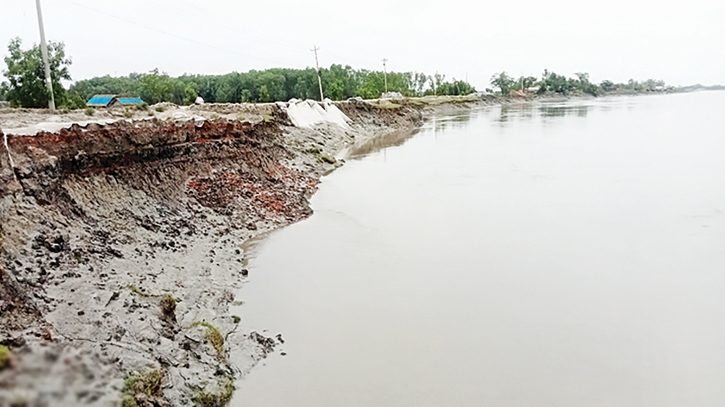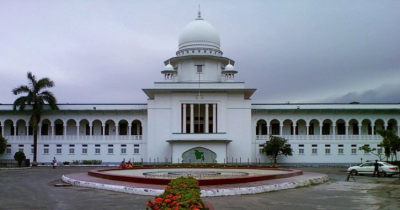
Continued deterioration of the dam along the Shibsa River in Paikgachha upazila poses a significant threat to 19 villages, residential areas, and educational institutions spanning three unions. Photo: Messenger
The recent collapse of the half-kilometer protection dam managed by the Water Development Board at Alamtala, along the Shibsa River in the Lashkar Union of Paikgachha upazila in Khulna, has reignited fears among the local populace. Approximately 50 thousand individuals residing in 19 villages across Lashkar, Chandkhali, and Amadi Union find themselves living in the shadow of imminent danger.
The severity of the situation cannot be emphasized enough. If the dam continues to deteriorate, it poses a serious risk to 19 villages, residential areas, and educational institutions across three unions, leaving them susceptible to flooding by saltwater. The potential damage, both economically and in terms of infrastructure, could amount to a huge amount of money, underscoring the urgent need for authorities to take immediate action.
Reports indicate that a year ago, a significant breach occurred in the Wapda dam situated at Alamtala, prompting the allocation of Tk 50 crore for remedial measures through a tender facilitated by JICA. Despite the allocation and subsequent tender, progress on the ground has been sluggish. The appointed contractor, R-Rat Corporation, ostensibly engaged in mitigating the collapse by deploying geo bags in affected areas for the past year and a half, has failed to initiate the primary construction necessary to avert disaster.
Lashkar UP Chairman KM Arifuzzaman Tuhin sheds light on the historical context of the issue, citing a century-old breakdown near the Shivsa River. He underscores the repeated efforts by the Water Development Board to address the recurring challenge, emphasizing the critical need for sustainable solutions.
Acknowledging the urgency of the situation, the government allocated funds in 2023 to address the pressing concerns raised by local residents. However, the failure of the contractor to deliver on their commitments has left the fate of 50 thousand individuals hanging in the balance. Moreover, the proximity of vital institutions such as the agricultural college and Chitta Recreation Park amplifies the stakes, necessitating immediate intervention from higher authorities.
Raju Howladar, Deputy Assistant Engineer of the Paikgachha Branch of the Water Development Board, expresses concerns over the sluggish pace of work by the contracting firm, particularly in addressing the fractured areas. While efforts have been made to alert higher authorities regarding the urgency of the situation, tangible progress remains elusive.
In response to mounting pressure, Ashraful Alam, Executive Engineer-2 of the Khulna Water Development Board, assures that measures are being taken to expedite the repair work in the damaged areas. However, assurances must translate into concrete action, as the window of
It underscores the need for proactive measures to address looming threats and prevent potential catastrophes. As the lives and livelihoods of thousands hang in the balance, swift and decisive action is not just desirable but imperative. Only through concerted efforts and unwavering commitment can we safeguard our communities and build a more resilient future.
The unfolding crisis demands immediate attention from both local and national authorities. With lives, livelihoods, and vital infrastructure at stake, there's no room for delay. It's incumbent upon all stakeholders to prioritize the safety and well-being of the affected communities and expedite the necessary remedial actions.
Messenger/Fameema








